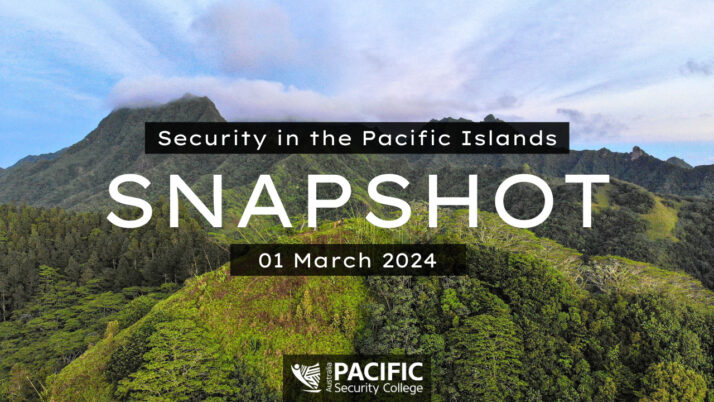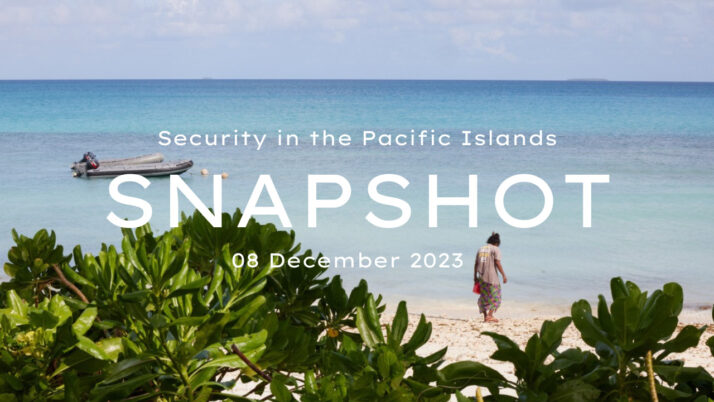Too few boots on the ground?
Meg Keen, Anouk Ride
Women still lack adequate influence in setting security agendas, yet there is evidence that significant gains can occur when a more gender-sensitive and inclusive approach is taken, Anouk Ride and Meg Keen write.
Despite gender advances in policy and practice, ‘security’ remains a domain where women’s footprints are rarely seen in decision making corridors, despite their key roles. Gender issues can be neglected in narrow security discourses with the predominant focus on crime, law and order, and border control.
Even the more encompassing Pacific Islands Forum Boe Declaration on Regional Security is relatively silent on gender. And, in times of security crises, such as the ongoing COVID one, gender issues still need more prominence.
The Regional Assistance Mission to Solomon Islands (RAMSI), an example of regional security collaboration, has been critiqued for its late consideration of gender impacts and the lack of women in leadership until quite late in its tenure. While these arguments have some merit, context matters.
Overall, female participation in RAMSI hovered about 20 per cent, reflective of numbers in regional police forces. Women’s participation in RAMSI increased over its term, and many who participated felt they made a unique contribution, even if this was not always rewarded or acknowledged, particularly on returning home.
At national levels, leadership of police, military and other security organisations remains predominantly male, and women face gender barriers to employment and promotion in the security sector – such as social norms that women should not use physical force, operate heavy machinery, be posted on patrol boats or lead teams of men.
Despite these persistent views, the tide is changing. A recent workshop in Papua New Guinea on Women in National Security noted that since the first women were recruited in 1977, there are now over 600 women in the police force working in diverse areas — progress is inching forward, though much work remains on career progression and conditions of service.
A broader definition of security – beyond crime, prisons, and police – reveals women’s significant role. Women have led prominent peace movements in the former conflict zones of Bougainville and Solomon Islands, where they mediated between militants in order to: ensure food and medicine was traded; schools and clinics were kept running; and local NGOs set up and sustained.
In matrilineal societies, women have influence over one of the key sources of power and security – land – and, in some areas, Bougainville being one, affect its stewardship, use and protection.
Even so, the path to more equality can be winding, women’s voices in the recent Bougainville independence referendum were often missing in formal negotiation processes.
In response to increases in women experiencing sexual and physical violence in the family, female leaders have established services for violence survivors, acted as advocates, and supported key changes to legislation and funding to tackle family violence. Despite these contributions, women’s empowerment and safety remains at risk.
Women often feel unsafe in urban areas and on public transport where they do not have social networks and a sense of control, and where they are more likely to be subject to sexual harassment and even rape. Not much will change until women have a stronger voice in policy-making and politics — where they are still grossly under-represented.
So, what can be done to change this? For a start, we can change the conversation. The separation of women’s security from security discourse is problematic. For instance, there are many correlations between domestic violence and conflict, but they tend to be tackled separately by policymakers, with experts and practitioners in domestic violence rarely being asked to share experience and strategies with security decision-makers.
When platforms for sharing experiences occur across sectoral divides, positive outcomes are possible, particularly when the focus is on the positive, not the punitive, such as international and national agencies sharing stories of success as part of the commitment to the UN Security Council resolution 1325 on Women, Peace and Security. Making progress means testing our assumptions and the dominant narrative on gender and security with those on the ground. Markets can be an insecure space for women, but not all markets are the same or suffer from similar problems.
One of our recent studies found women market vendors feel more safe in informal markets than those run by the authorities in Honiara, because they could more effectively police these spaces in partnership with male vendors using social/community controls. Social networks can be powerful behavioural moderators but are undervalued in security forums.
Recently, informal markets in Solomon Islands were closed by the authorities, prior to schools, churches, and other gathering places, in a response to COVID-19. There was little consideration of how the government and vendors could work together to protect and progress food security through engagement of the predominantly women vendors.
Often, decision-making for markets, predominantly women’s spaces, as well as other social spaces, is not inclusive. For example, markets are mostly ‘secured’ and governed by male counsellors, security guards, and revenue collectors, with minimal female participation. If women were part of this process, they could be engaged and empowered, and the results can be beneficial for all, as evident from the UN Women Market for Change program.
Even so, current security experts and policymakers can be complacent and maintain a narrow frame of reference for the role of women in security. Despite a prominent role of women in peacemaking after violent conflict and community spaces, the Melanesian countries have very few women in senior decision-making roles, as clear from the group photo of their last meeting on security – for the Regional Security Strategy Working Group. This forum also lacks women’s advisory input, similar to many other security forums.
Still, there is good news. Emerging women’s networks are beginning to integrate women’s voices into decision-making forums. In some institutions, such as Correctional Services Solomon Islands, networks of women security staff, forged through difficult experiences and pioneering leadership, have advocated for actions to remove barriers to their employment and leadership.
At the regional level, the Pacific Islands Chiefs of Police Women’s Advisory Network is being established and aims to be an effective women-led catalyst for strategic advice and decision-making.
A review of women’s participation in regional meetings about security and governance concluded women can be an afterthought, entering discussions after agendas had already been set, and able to make little impact. Governments, and development and security agencies, are making more space to enhance women’s agency over security, elevate women’s networks into security dialogues, and work collectively and strategically to address barriers to women’s leadership — but there is often unnecessary delay putting these words into action.
Pacific leaders need to set gender sensitive goals that are monitored and evaluated and move from gender statements to practice. This could open the way for more women to tread in the security space, and would certainly make a difference for the better.
Read more blogs by Meg Keen here.
More Stories

Security Snapshot - 1 Mar 2024
Pacific Security Snapshot | 01 March 2024
The security stories shaping the region ➣ Pacific Islands Leaders Meeting (PALM) to be held in Tokyo in July 2024 ➣ 2023 warmest year on record, globally ➣ Elections across the Pacific prompting changes to diplomatic relations and security arrangements ➣ Extractive industries booming ➣ Environmental conservation efforts ongoing ➣ PNG riots shed light on…

Security Snapshot - 11 Dec 2023
Pacific Security Snapshot | 08 December 2023
The security stories shaping the region Outcomes from 52nd Pacific Islands Forum Leaders’ Meeting in Cook Islands 12th General Assembly of the Pacific Conference of Churches Australia-Tuvalu Falepili Union signed Pacific climate change advocacy at COP28 EU-ACP Samoa Agreement signed Solomon Islands hosts 2023 Pacific Games First PNG woman for peacekeeping duties Regionalism The Fifty-Second…







